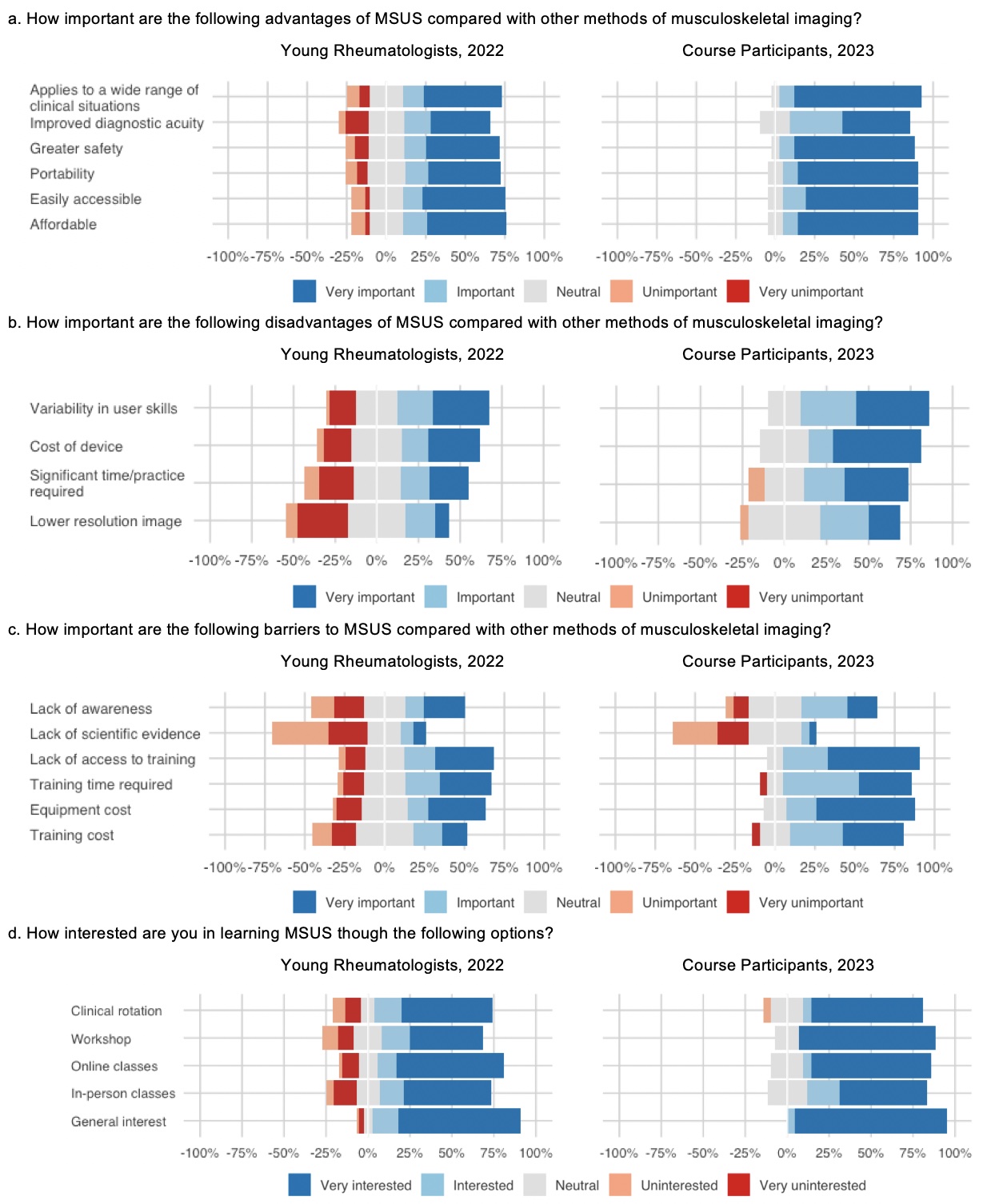Session Information
Session Type: Poster Session C
Session Time: 10:30AM-12:30PM
Background/Purpose: Musculoskeletal ultrasound (MSUS) is a valuable diagnostic tool in rheumatology, yet access to formal MSUS training in Latin America remains limited. In a 2022 national survey, early-career Mexican rheumatologists reported high interest in MSUS but faced substantial barriers. To address this gap, we implemented and evaluated a hybrid MSUS training course. This study compares national survey data with outcomes from course participants to assess the impact of targeted hybrid training on clinical use, training exposure, and institutional integration of MSUS.
Methods: We conducted a cross-sectional analysis of two cohorts. The 2022 cohort (Nf96) consisted of early-career rheumatologists across Mexico who responded to a national survey on MSUS access, training, and clinical use. The 2023 cohort (Nf21) included participants who completed a structured hybrid MSUS training program (online modules + in-person workshop) and completed a follow-up survey three months post-course. Surveys assessed prior training, current MSUS use, educational preferences, institutional context, and barriers. Descriptive statistics and chi-square or Fisher’s exact tests were used to compare groups.
Results: Participants in the hybrid training intervention demonstrated significantly higher MSUS utilization (47.6% vs. 20.8%, p=0.011) and more frequently had ≤1 year of MSUS experience (80% vs. 34.2%). Prior MSUS training was also more common (76.2% vs. 57.3%), while awareness of workshops (19.1% vs. 55.2%, p=0.003) and online courses (14.3% vs. 39.6%, p=0.028) was lower. Hybrid participants showed greater preference for online training formats (p=0.014), and more frequently cited training cost (p=0.018) and equipment access (p=0.064) as barriers. Institutional MSUS use and departmental experience were also significantly more prevalent in the course cohort (p=0.026).
Conclusion: A hybrid MSUS training intervention for early-career rheumatologists in Mexico led to increased MSUS utilization, institutional integration, and training exposure compared to national trends. These findings highlight the potential of scalable hybrid education models to address training gaps and promote equitable MSUS adoption in underserved settings. This underscores the need for broader implementation strategies and institutional investment to build rheumatologic imaging capacity across Latin America.
 Timeline of a hybrid MSUS training intervention and evaluation in Mexico.
Timeline of a hybrid MSUS training intervention and evaluation in Mexico.
Figure 1. Timeline of a hybrid MSUS training intervention and evaluation in Mexico. A three-phase study was conducted to assess access to musculoskeletal ultrasound (MSUS) training and the impact of a hybrid education intervention among early-career rheumatologists in Mexico. In Phase 1 (Spring 2022), a national needs assessment survey (N = 96) identified barriers to MSUS training and utilization. In Phase 2 (Fall 2022), a structured hybrid MSUS course combining online modules and in-person workshops was delivered. In Phase 3 (Spring 2023), a follow-up survey of course participants (N = 21) evaluated changes in MSUS practice, training exposure, and institutional support. The intervention was associated with higher MSUS usage and training engagement relative to national trends.
.jpg) Table 1. Comparative characteristics of MSUS knowledge, clinical practices, and perceived barriers among early-career rheumatologists.
Table 1. Comparative characteristics of MSUS knowledge, clinical practices, and perceived barriers among early-career rheumatologists.
.jpg) Figure 2. Comparative perceptions of musculoskeletal ultrasound among early-career rheumatologists following a national survey and a hybrid training intervention. Perceptions of MSUS access, training, and clinical use were assessed in two cohorts of early-career rheumatologists in Mexico. The figure illustrates differences in reported advantages, disadvantages, barriers, and preferences for future education modalities. Between-group comparisons highlight the potential impact of targeted hybrid training on early adoption and institutional integration of MSUS.
Figure 2. Comparative perceptions of musculoskeletal ultrasound among early-career rheumatologists following a national survey and a hybrid training intervention. Perceptions of MSUS access, training, and clinical use were assessed in two cohorts of early-career rheumatologists in Mexico. The figure illustrates differences in reported advantages, disadvantages, barriers, and preferences for future education modalities. Between-group comparisons highlight the potential impact of targeted hybrid training on early adoption and institutional integration of MSUS.
To cite this abstract in AMA style:
Garcia-Pompermayer M, AYTON S, Silva Luna K, Ramirez-Morales R, Garza Elizondo M. Transforming MSUS Access in Mexico: A Comparative Study of National Trends and a Hybrid Training Cohort [abstract]. Arthritis Rheumatol. 2025; 77 (suppl 9). https://acrabstracts.org/abstract/transforming-msus-access-in-mexico-a-comparative-study-of-national-trends-and-a-hybrid-training-cohort/. Accessed .« Back to ACR Convergence 2025
ACR Meeting Abstracts - https://acrabstracts.org/abstract/transforming-msus-access-in-mexico-a-comparative-study-of-national-trends-and-a-hybrid-training-cohort/
